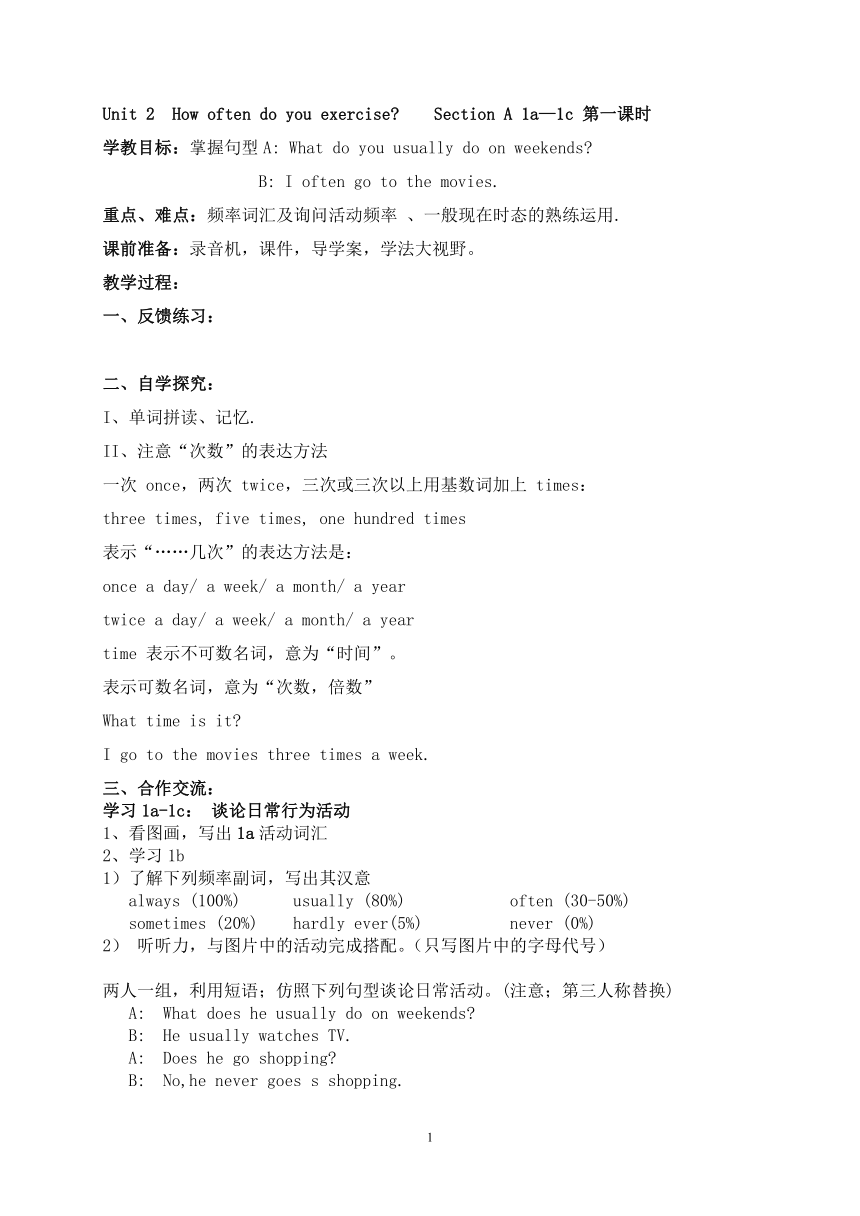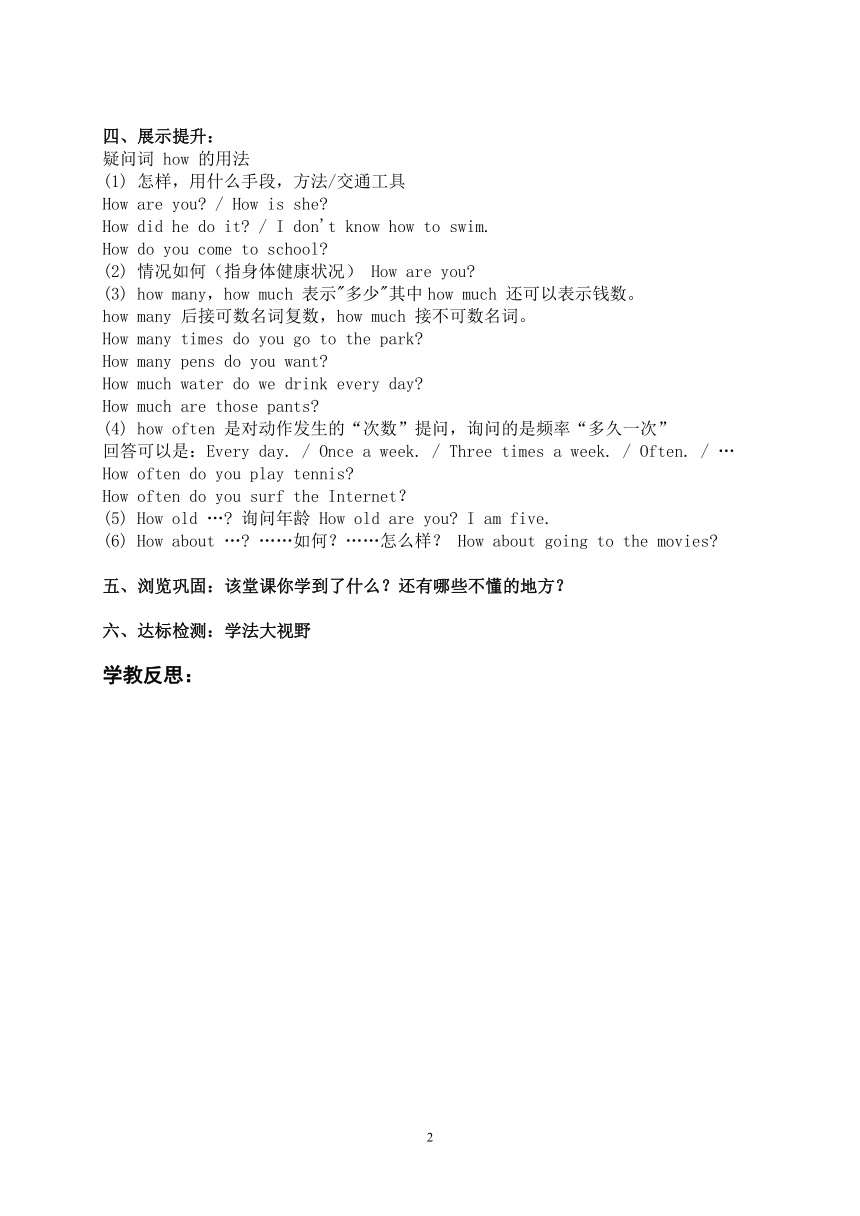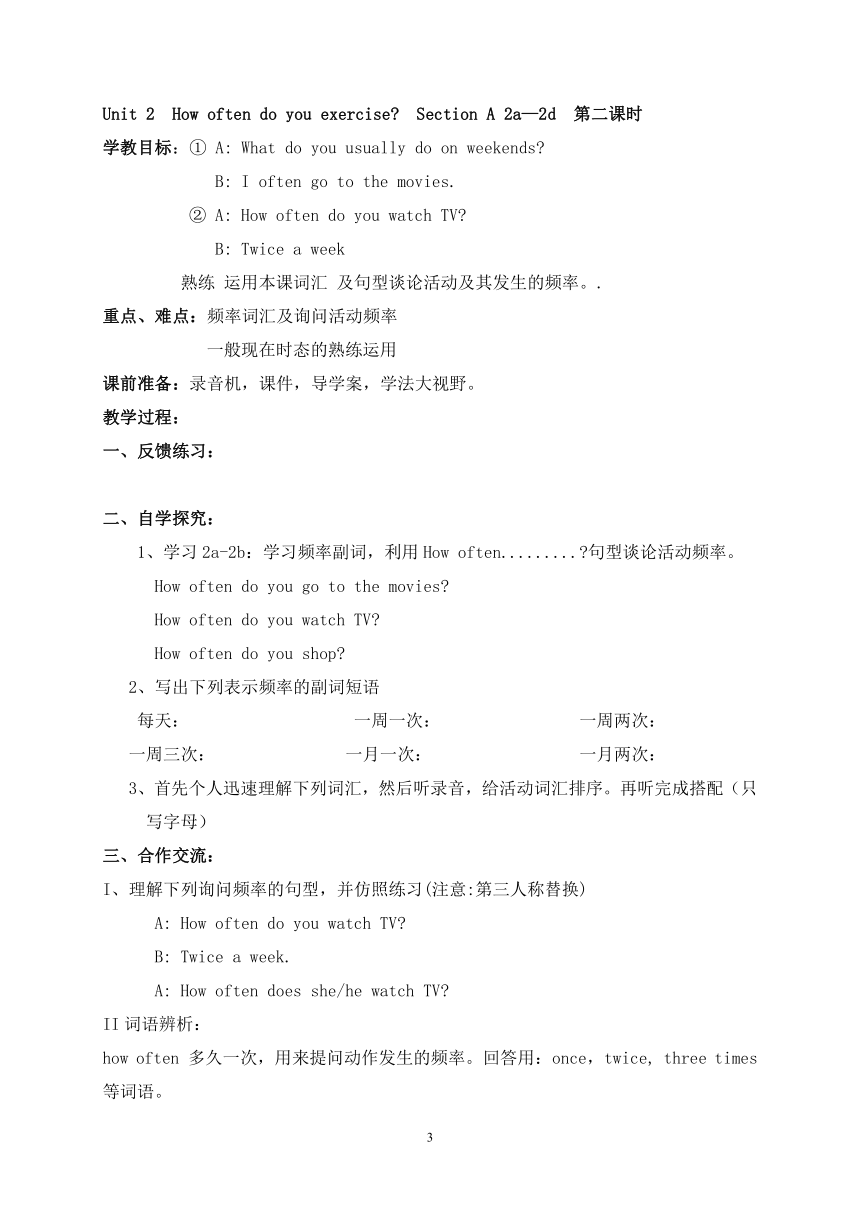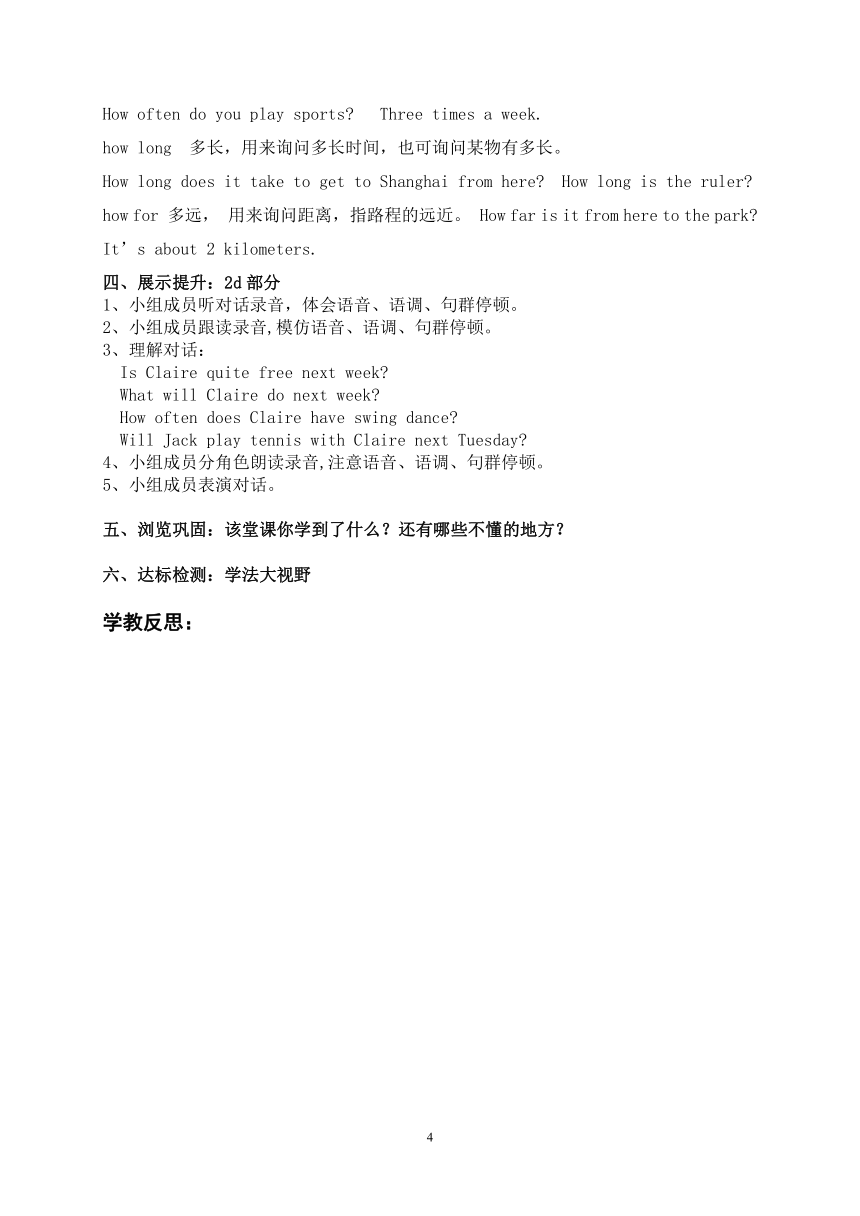Unit 2 How often do you exercise?导学案
文档属性
| 名称 | Unit 2 How often do you exercise?导学案 |  | |
| 格式 | zip | ||
| 文件大小 | 22.5KB | ||
| 资源类型 | 教案 | ||
| 版本资源 | 人教新目标(Go for it)版 | ||
| 科目 | 英语 | ||
| 更新时间 | 2013-12-05 23:16:10 | ||
图片预览





文档简介
Unit 2 How often do you exercise Section A 1a—1c 第一课时
学教目标:掌握句型A: What do you usually do on weekends
B: I often go to the movies.
重点、难点:频率词汇及询问活动频率 、一般现在时态的熟练运用.
课前准备:录音机,课件,导学案,学法大视野。
教学过程:
一、反馈练习:
二、自学探究:
I、单词拼读、记忆.
II、注意“次数”的表达方法
一次 once,两次 twice,三次或三次以上用基数词加上 times:
three times, five times, one hundred times
表示“……几次”的表达方法是:
once a day/ a week/ a month/ a year
twice a day/ a week/ a month/ a year
time 表示不可数名词,意为“时间”。
表示可数名词,意为“次数,倍数”
What time is it
I go to the movies three times a week.
三、合作交流:
学习1a-1c: 谈论日常行为活动
1、看图画,写出1a活动词汇
2、学习1b
1)了解下列频率副词,写出其汉意
always (100%) usually (80%) often (30-50%)
sometimes (20%) hardly ever(5%) never (0%)
2) 听听力,与图片中的活动完成搭配。(只写图片中的字母代号)
两人一组,利用短语;仿照下列句型谈论日常活动。(注意;第三人称替换)
A: What does he usually do on weekends
B: He usually watches TV.
A: Does he go shopping
B: No,he never goes s shopping.
四、展示提升:
疑问词 how 的用法
(1) 怎样,用什么手段,方法/交通工具
How are you / How is she
How did he do it / I don't know how to swim.
How do you come to school
(2) 情况如何(指身体健康状况) How are you
(3) how many,how much 表示"多少"其中how much 还可以表示钱数。
how many 后接可数名词复数,how much 接不可数名词。
How many times do you go to the park
How many pens do you want
How much water do we drink every day
How much are those pants
(4) how often 是对动作发生的“次数”提问,询问的是频率“多久一次”
回答可以是:Every day. / Once a week. / Three times a week. / Often. / …
How often do you play tennis
How often do you surf the Internet?
(5) How old … 询问年龄 How old are you I am five.
(6) How about … ……如何?……怎么样? How about going to the movies
五、浏览巩固:该堂课你学到了什么?还有哪些不懂的地方?
六、达标检测:学法大视野
学教反思:
Unit 2 How often do you exercise Section A 2a—2d 第二课时
学教目标:① A: What do you usually do on weekends
B: I often go to the movies.
② A: How often do you watch TV
B: Twice a week
熟练 运用本课词汇 及句型谈论活动及其发生的频率。.
重点、难点:频率词汇及询问活动频率
一般现在时态的熟练运用
课前准备:录音机,课件,导学案,学法大视野。
教学过程:
一、反馈练习:
二、自学探究:
1、学习2a-2b:学习频率副词,利用How often......... 句型谈论活动频率。
How often do you go to the movies
How often do you watch TV
How often do you shop
2、写出下列表示频率的副词短语
每天: 一周一次: 一周两次:
一周三次: 一月一次: 一月两次:
3、首先个人迅速理解下列词汇,然后听录音,给活动词汇排序。再听完成搭配(只写字母)
三、合作交流:
I、理解下列询问频率的句型,并仿照练习(注意:第三人称替换)
A: How often do you watch TV
B: Twice a week.
A: How often does she/he watch TV
II词语辨析:
how often 多久一次,用来提问动作发生的频率。回答用:once,twice, three times 等词语。
How often do you play sports Three times a week.
how long 多长,用来询问多长时间,也可询问某物有多长。
How long does it take to get to Shanghai from here How long is the ruler
how for 多远, 用来询问距离,指路程的远近。 How far is it from here to the park It’s about 2 kilometers.
四、展示提升:2d部分
1、小组成员听对话录音,体会语音、语调、句群停顿。
2、小组成员跟读录音,模仿语音、语调、句群停顿。
3、理解对话:
Is Claire quite free next week
What will Claire do next week
How often does Claire have swing dance
Will Jack play tennis with Claire next Tuesday
4、小组成员分角色朗读录音,注意语音、语调、句群停顿。
5、小组成员表演对话。
五、浏览巩固:该堂课你学到了什么?还有哪些不懂的地方?
六、达标检测:学法大视野
学教反思:
Unit 2 How often do you exercise Section A Grammar Focus—3c 第三课时
学教目标:① A: What does he usually do on weekends
B: He often goes to the movies.
② A: How often does he watch TV
B: Twice a week
熟练 运用本课词汇 及句型谈论活动及其发生的频率。.
重点、难点:频率词汇及询问活动频率
一般现在时态的熟练运用
课前准备:录音机,课件,导学案,学法大视野。
教学过程:
一、反馈练习:
二、自学探究:
1、小组成员阅读语法要点,明确句子含义:
What do you usually do on weekends I always exercise.
What do they do on weekends They often help with housework.
What does she do on weekends She sometimes goes shopping.
How often do you go to the movies I go to the movies maybe once a month.
How often does he watch TV He hardly ever watches TV.
Do you go shopping No, I never go shopping.
三、合作交流:
1、小组成员阅抽查句子,英汉互译
2、小组成员阅勾画短语并抽查背诵
on weekends help with housework
goes shopping go to the movies
maybe once a month. never go shopping.
hardly ever watches TV
四、展示提升:
1、完成3a
2、区别词语用法
1)sometimes , sometime, some times , some time 的区别:
sometimes 有时候
sometime 过去或将来的某个时候
some times 好几次
some time 一段时间
2)exercise v./ n. shop v./ n.
He often exercises on weekends.
We often do / take exercise on weekends.
We often shop on weekends.
There are many shops in the neighborhood.
3、翻译下列短语:
stay up late a healthy breakfast
play sports at least
hardly ever twice a week
go to bed early
4、完成3b&3c.
五、浏览巩固: 该堂课你学到了什么?还有哪些不懂的地方?
六、达标检测:学法大视野。
学教反思:
Unit 2 How often do you exercise SectionB 2d 第四课时
学教目标:① A: What do you usually do on weekends
B: I often go to the movies.
② A: How often do you drink milk
B: Twice a week
熟练 运用本课词汇 及句型谈论活动及其发生的频率。.
重点、难点:1、会认读、拼写本课的单词和短语;
2、正确运用How often 引导的疑问句进行交际。
3、一般现在时态的熟练运用.
课前准备:录音机,课件,导学案,学法大视野。
教学过程:
一、反馈练习:
二、自学探究:
学习1a,会读写单词及短语
(1)个人记读单词3分钟
(2)展示,写在学案上
垃圾食品 _________ 牛奶______ 咖啡______
睡眠_______ 蔬菜________ 水果
(3) 将单词和图画配对
学习1b对话,谈论某人做某事的频率
1、个人迅速朗读对话,注意语音、语调、句群停顿。
2、再次朗读对话,准确理解意思
3、两人一组练习对话,向全班展示
4、用1a的单词,模仿1b编对话,并在组内交流
A: How often do you drink milk ,Liu Fang
B: I drink milk every day.
A:Do you like it
B: No.But my mother wants me to drink it, she says it’s good for my health.
三、合作交流:
1c 1d 听力训练
(1)放录音,完成1c
(2) 听第二遍,回答1d的7个问题,把答案写在课本上
(3)听第三遍,检查答案,并进一步理解听力原文.
(4)听全文,跟读材料,注意模仿语音、语调、句群停顿。
(5)根据1d内容,进行采访问答
A: How often do you exercise
B: I exercise every day.
A: How often does Bill exercise
B: He hardly ever exercises.
四、展示提升:
重点词组练习:
(1)want sb to do sth 想要某人做某事
My mother wants me to drink it.我妈妈想要我喝。
want to do sth. 想要做某事
want sb. to do sth. 想要某人干某事
Do you want to go to the movies with me?你想和我一起去看电影吗?
I want you to help me with my math.我想要你帮我学数学。
有很多动词后面用这种结构做动词的复合宾语:
ask sb. to do sth. 叫某人做某事
tell sb. to do sth. 告诉某人去做某事
help sb. (to) do sth. 帮助某人做某事
(2) be good/bad for 对----有好/坏处
be good for … 表示“对……有益(有好处)”
其反义为:be bad for … 对……有害/无益
It’s good for us to do more reading.多读书对我们有好处。
Drinking milk is good for your health.喝牛奶对你的健康有益。
Reading English is good for studying English.对英语对学习英语有益/有帮助。
Reading in bed is bad for your eyes.在床上读书对你的眼睛有害。
五、浏览巩固: 该堂课你学到了什么?还有哪些不懂的地方?
六、达标检测:学法大视野
学教反思:
Unit 2 How often do you exercise Section B 2a—2e 第五课时少
学教目标:掌握本课的生词、短语、句型、理解本课的主旨大意
对本课的内容进行归纳、对话改写、及仿写。
重点、难点:学会用过去式写调查报告。
掌握本课的生词、短语、句型
对本课的内容进行归纳、改写、及仿写。
课前准备:录音机,课件,导学案,学法大视野。
教学过程:
一、反馈练习:
二、自学探究:
Task1: new words learning
Students read and learn the new words after the team leader.
Students read the new words by themselves.
Task2:听2b磁带,体会语音、语调、句群停顿,理解段落的汉语意义。
Task3:完成2b
Task3:小组讨论核对答案。
Task4: 朗读短文,并回答下列问题
1). What does the word “exercise” in the passage mean
2) What’s the Chinese for “ once or twice”
3) Do all the students like watching TV
三、合作交流:
仔细阅读课文,完成2c
1、仔细阅读2b课文,注意模仿语音、语调、句群停顿
在原文中找出2c的句子
2、根据要求完成2c
3、检查答案
四、展示提升:
I、maybe / may be
①.The baby is crying, she is hungry. = The baby is crying, she _________ hungry.
②.The woman a teacher . = ______ the woman is a teacher.
maybe 是副词,意为“大概, 可能,或许”,一般用于句首。May be是情态动词,意为“可能是..,也许是..,大概是..”.
Ⅱ、a few / few / a little / little
①. people can live to 100,but people can live to 150.
②. There is time left, I don’t catch the first bus.
③. Could you give me milk
a few (少数的,几个,一些) a little (一点儿,少量) 表示肯定
few (很少的,几乎没有的) little (很少的,几乎没有的) 表示否定
修饰可数名词 修饰不可数名词
Ⅲ、hard / hardly hard作形容词,意为“困难的,艰苦的,硬的”;作副词,意为“努力地,猛烈地”。hardly意为“几乎不”。
①. The ground is too to dig
②. I can understand them.
③. It’s raining ,the people can go outside.
IV surprise用法
A surprise可做名词,基本用法如下:
1)表示“惊讶”时,是不可数名词。常用短语:in surprise 惊讶地;to one's surprise 让某人惊讶的是
2)表示“令’惊讶的事务/意外之事”时,是可数名词
2. surprise还可以做及物动词,意思是“使...惊讶”。常用短语:surprise sb
五、浏览巩固:该堂课你学到了什么?还有哪些不懂的地方?
六、达标检测:学法大视野
学教反思:
Unit 2 How often do you exercise Section B 3a—selfcheck 第六课时
学教目标: What do you usually do on weekends I sometimes go to the beach.
How often do you eat vegetables Every day.
Most students do homework every day.
会使用频率副词及短语;能描述课余时间的活动安排;
建议学生培养良好的学习和生活习惯
重点、难点:会使用频率副词及短语;能描述课余时间的活动安排;
课前准备:录音机,课件,导学案,学法大视野。
教学过程:
一、反馈练习:
二、自学探究:
1、仔细观察表格,谈谈你自己选择哪种方式;
2、再次朗读文段,弄懂大意并选词填空;
3、检查答案;
4、再次大声朗读文段。
5、完成对自己的生活习惯的调查表No.4 on P16.
三、合作交流:完成3b
联系自己的日常生活实际,各写好坏习惯3个、发生频率以及各自作用;
完整写出自己的句子,注意时态正确;
加上连接词使这5个句子成为一段文章
加上标题。工整抄写在3c处。
四、展示提升:
I、 本单元重点句子读背
II、重点词语用法积累
1) pretty表示“十分”作副词用,我们以前学过quite和very也有这种意思。其中它们的程度由浅入深为quite→pretty→very. 相当健康:
2) I exercise every day, usually when I come home from school.我每天锻炼身体,
3) eating habits:
4) try to do sth意为 eg:他尽力通过考试:
5) Of course.:
6) So you see, I look after my health. 所以你看,我很在意我的健康。
look after 意为 = take care of
eg:Can you when I leave 能帮我照顾一下孩子吗?
look还可以和许多词搭配,但意思不一样。
(1) look at eg:Please look at the blackboard.
(2) look for eg:我在找我的笔
(3) look like eg::你爸爸长什么样 ___________________________
7) Good food and exercise 好的饮食和锻炼帮助我学得更好。
帮助某人做某事 / /
8) be good for be good at =do well in be good to sb.
9) 和…相同 与……不同
不同: (n.)difference . There are many (不同点)between the two pictures.
10) although虽然,尽管,引导让步状语从句,与 _ 同义,但不能与 同时出现在一个复合句中,可与still, yet同用。
11) 保持健康: = be in good health =keep/ be healthy
She says it’s good for my health. 她说这对我的健康有益。
be good for表示 ,其反义词组是
be good at表示 ,其同义词组是
eg: It to go to bed early. 早睡对你有好处。
He Chinese now.他现在擅长于中文。
12). I try to eat a lot of vegetables. 我尽量多吃疏菜。
try to do sth. 意为
eg: I’ll try . 我要设法学好英语。
注意:try后也可接v.ing形式。try doing sth. 意为 表示想知道结果而尝试着做做看。Eg: Let’s try 咱们敲敲门试试。
五、浏览巩固:该堂课你学到了什么?还有哪些不懂的地方?
六、达标检测:学法大视野。
学教反思:
PAGE
12
学教目标:掌握句型A: What do you usually do on weekends
B: I often go to the movies.
重点、难点:频率词汇及询问活动频率 、一般现在时态的熟练运用.
课前准备:录音机,课件,导学案,学法大视野。
教学过程:
一、反馈练习:
二、自学探究:
I、单词拼读、记忆.
II、注意“次数”的表达方法
一次 once,两次 twice,三次或三次以上用基数词加上 times:
three times, five times, one hundred times
表示“……几次”的表达方法是:
once a day/ a week/ a month/ a year
twice a day/ a week/ a month/ a year
time 表示不可数名词,意为“时间”。
表示可数名词,意为“次数,倍数”
What time is it
I go to the movies three times a week.
三、合作交流:
学习1a-1c: 谈论日常行为活动
1、看图画,写出1a活动词汇
2、学习1b
1)了解下列频率副词,写出其汉意
always (100%) usually (80%) often (30-50%)
sometimes (20%) hardly ever(5%) never (0%)
2) 听听力,与图片中的活动完成搭配。(只写图片中的字母代号)
两人一组,利用短语;仿照下列句型谈论日常活动。(注意;第三人称替换)
A: What does he usually do on weekends
B: He usually watches TV.
A: Does he go shopping
B: No,he never goes s shopping.
四、展示提升:
疑问词 how 的用法
(1) 怎样,用什么手段,方法/交通工具
How are you / How is she
How did he do it / I don't know how to swim.
How do you come to school
(2) 情况如何(指身体健康状况) How are you
(3) how many,how much 表示"多少"其中how much 还可以表示钱数。
how many 后接可数名词复数,how much 接不可数名词。
How many times do you go to the park
How many pens do you want
How much water do we drink every day
How much are those pants
(4) how often 是对动作发生的“次数”提问,询问的是频率“多久一次”
回答可以是:Every day. / Once a week. / Three times a week. / Often. / …
How often do you play tennis
How often do you surf the Internet?
(5) How old … 询问年龄 How old are you I am five.
(6) How about … ……如何?……怎么样? How about going to the movies
五、浏览巩固:该堂课你学到了什么?还有哪些不懂的地方?
六、达标检测:学法大视野
学教反思:
Unit 2 How often do you exercise Section A 2a—2d 第二课时
学教目标:① A: What do you usually do on weekends
B: I often go to the movies.
② A: How often do you watch TV
B: Twice a week
熟练 运用本课词汇 及句型谈论活动及其发生的频率。.
重点、难点:频率词汇及询问活动频率
一般现在时态的熟练运用
课前准备:录音机,课件,导学案,学法大视野。
教学过程:
一、反馈练习:
二、自学探究:
1、学习2a-2b:学习频率副词,利用How often......... 句型谈论活动频率。
How often do you go to the movies
How often do you watch TV
How often do you shop
2、写出下列表示频率的副词短语
每天: 一周一次: 一周两次:
一周三次: 一月一次: 一月两次:
3、首先个人迅速理解下列词汇,然后听录音,给活动词汇排序。再听完成搭配(只写字母)
三、合作交流:
I、理解下列询问频率的句型,并仿照练习(注意:第三人称替换)
A: How often do you watch TV
B: Twice a week.
A: How often does she/he watch TV
II词语辨析:
how often 多久一次,用来提问动作发生的频率。回答用:once,twice, three times 等词语。
How often do you play sports Three times a week.
how long 多长,用来询问多长时间,也可询问某物有多长。
How long does it take to get to Shanghai from here How long is the ruler
how for 多远, 用来询问距离,指路程的远近。 How far is it from here to the park It’s about 2 kilometers.
四、展示提升:2d部分
1、小组成员听对话录音,体会语音、语调、句群停顿。
2、小组成员跟读录音,模仿语音、语调、句群停顿。
3、理解对话:
Is Claire quite free next week
What will Claire do next week
How often does Claire have swing dance
Will Jack play tennis with Claire next Tuesday
4、小组成员分角色朗读录音,注意语音、语调、句群停顿。
5、小组成员表演对话。
五、浏览巩固:该堂课你学到了什么?还有哪些不懂的地方?
六、达标检测:学法大视野
学教反思:
Unit 2 How often do you exercise Section A Grammar Focus—3c 第三课时
学教目标:① A: What does he usually do on weekends
B: He often goes to the movies.
② A: How often does he watch TV
B: Twice a week
熟练 运用本课词汇 及句型谈论活动及其发生的频率。.
重点、难点:频率词汇及询问活动频率
一般现在时态的熟练运用
课前准备:录音机,课件,导学案,学法大视野。
教学过程:
一、反馈练习:
二、自学探究:
1、小组成员阅读语法要点,明确句子含义:
What do you usually do on weekends I always exercise.
What do they do on weekends They often help with housework.
What does she do on weekends She sometimes goes shopping.
How often do you go to the movies I go to the movies maybe once a month.
How often does he watch TV He hardly ever watches TV.
Do you go shopping No, I never go shopping.
三、合作交流:
1、小组成员阅抽查句子,英汉互译
2、小组成员阅勾画短语并抽查背诵
on weekends help with housework
goes shopping go to the movies
maybe once a month. never go shopping.
hardly ever watches TV
四、展示提升:
1、完成3a
2、区别词语用法
1)sometimes , sometime, some times , some time 的区别:
sometimes 有时候
sometime 过去或将来的某个时候
some times 好几次
some time 一段时间
2)exercise v./ n. shop v./ n.
He often exercises on weekends.
We often do / take exercise on weekends.
We often shop on weekends.
There are many shops in the neighborhood.
3、翻译下列短语:
stay up late a healthy breakfast
play sports at least
hardly ever twice a week
go to bed early
4、完成3b&3c.
五、浏览巩固: 该堂课你学到了什么?还有哪些不懂的地方?
六、达标检测:学法大视野。
学教反思:
Unit 2 How often do you exercise SectionB 2d 第四课时
学教目标:① A: What do you usually do on weekends
B: I often go to the movies.
② A: How often do you drink milk
B: Twice a week
熟练 运用本课词汇 及句型谈论活动及其发生的频率。.
重点、难点:1、会认读、拼写本课的单词和短语;
2、正确运用How often 引导的疑问句进行交际。
3、一般现在时态的熟练运用.
课前准备:录音机,课件,导学案,学法大视野。
教学过程:
一、反馈练习:
二、自学探究:
学习1a,会读写单词及短语
(1)个人记读单词3分钟
(2)展示,写在学案上
垃圾食品 _________ 牛奶______ 咖啡______
睡眠_______ 蔬菜________ 水果
(3) 将单词和图画配对
学习1b对话,谈论某人做某事的频率
1、个人迅速朗读对话,注意语音、语调、句群停顿。
2、再次朗读对话,准确理解意思
3、两人一组练习对话,向全班展示
4、用1a的单词,模仿1b编对话,并在组内交流
A: How often do you drink milk ,Liu Fang
B: I drink milk every day.
A:Do you like it
B: No.But my mother wants me to drink it, she says it’s good for my health.
三、合作交流:
1c 1d 听力训练
(1)放录音,完成1c
(2) 听第二遍,回答1d的7个问题,把答案写在课本上
(3)听第三遍,检查答案,并进一步理解听力原文.
(4)听全文,跟读材料,注意模仿语音、语调、句群停顿。
(5)根据1d内容,进行采访问答
A: How often do you exercise
B: I exercise every day.
A: How often does Bill exercise
B: He hardly ever exercises.
四、展示提升:
重点词组练习:
(1)want sb to do sth 想要某人做某事
My mother wants me to drink it.我妈妈想要我喝。
want to do sth. 想要做某事
want sb. to do sth. 想要某人干某事
Do you want to go to the movies with me?你想和我一起去看电影吗?
I want you to help me with my math.我想要你帮我学数学。
有很多动词后面用这种结构做动词的复合宾语:
ask sb. to do sth. 叫某人做某事
tell sb. to do sth. 告诉某人去做某事
help sb. (to) do sth. 帮助某人做某事
(2) be good/bad for 对----有好/坏处
be good for … 表示“对……有益(有好处)”
其反义为:be bad for … 对……有害/无益
It’s good for us to do more reading.多读书对我们有好处。
Drinking milk is good for your health.喝牛奶对你的健康有益。
Reading English is good for studying English.对英语对学习英语有益/有帮助。
Reading in bed is bad for your eyes.在床上读书对你的眼睛有害。
五、浏览巩固: 该堂课你学到了什么?还有哪些不懂的地方?
六、达标检测:学法大视野
学教反思:
Unit 2 How often do you exercise Section B 2a—2e 第五课时少
学教目标:掌握本课的生词、短语、句型、理解本课的主旨大意
对本课的内容进行归纳、对话改写、及仿写。
重点、难点:学会用过去式写调查报告。
掌握本课的生词、短语、句型
对本课的内容进行归纳、改写、及仿写。
课前准备:录音机,课件,导学案,学法大视野。
教学过程:
一、反馈练习:
二、自学探究:
Task1: new words learning
Students read and learn the new words after the team leader.
Students read the new words by themselves.
Task2:听2b磁带,体会语音、语调、句群停顿,理解段落的汉语意义。
Task3:完成2b
Task3:小组讨论核对答案。
Task4: 朗读短文,并回答下列问题
1). What does the word “exercise” in the passage mean
2) What’s the Chinese for “ once or twice”
3) Do all the students like watching TV
三、合作交流:
仔细阅读课文,完成2c
1、仔细阅读2b课文,注意模仿语音、语调、句群停顿
在原文中找出2c的句子
2、根据要求完成2c
3、检查答案
四、展示提升:
I、maybe / may be
①.The baby is crying, she is hungry. = The baby is crying, she _________ hungry.
②.The woman a teacher . = ______ the woman is a teacher.
maybe 是副词,意为“大概, 可能,或许”,一般用于句首。May be是情态动词,意为“可能是..,也许是..,大概是..”.
Ⅱ、a few / few / a little / little
①. people can live to 100,but people can live to 150.
②. There is time left, I don’t catch the first bus.
③. Could you give me milk
a few (少数的,几个,一些) a little (一点儿,少量) 表示肯定
few (很少的,几乎没有的) little (很少的,几乎没有的) 表示否定
修饰可数名词 修饰不可数名词
Ⅲ、hard / hardly hard作形容词,意为“困难的,艰苦的,硬的”;作副词,意为“努力地,猛烈地”。hardly意为“几乎不”。
①. The ground is too to dig
②. I can understand them.
③. It’s raining ,the people can go outside.
IV surprise用法
A surprise可做名词,基本用法如下:
1)表示“惊讶”时,是不可数名词。常用短语:in surprise 惊讶地;to one's surprise 让某人惊讶的是
2)表示“令’惊讶的事务/意外之事”时,是可数名词
2. surprise还可以做及物动词,意思是“使...惊讶”。常用短语:surprise sb
五、浏览巩固:该堂课你学到了什么?还有哪些不懂的地方?
六、达标检测:学法大视野
学教反思:
Unit 2 How often do you exercise Section B 3a—selfcheck 第六课时
学教目标: What do you usually do on weekends I sometimes go to the beach.
How often do you eat vegetables Every day.
Most students do homework every day.
会使用频率副词及短语;能描述课余时间的活动安排;
建议学生培养良好的学习和生活习惯
重点、难点:会使用频率副词及短语;能描述课余时间的活动安排;
课前准备:录音机,课件,导学案,学法大视野。
教学过程:
一、反馈练习:
二、自学探究:
1、仔细观察表格,谈谈你自己选择哪种方式;
2、再次朗读文段,弄懂大意并选词填空;
3、检查答案;
4、再次大声朗读文段。
5、完成对自己的生活习惯的调查表No.4 on P16.
三、合作交流:完成3b
联系自己的日常生活实际,各写好坏习惯3个、发生频率以及各自作用;
完整写出自己的句子,注意时态正确;
加上连接词使这5个句子成为一段文章
加上标题。工整抄写在3c处。
四、展示提升:
I、 本单元重点句子读背
II、重点词语用法积累
1) pretty表示“十分”作副词用,我们以前学过quite和very也有这种意思。其中它们的程度由浅入深为quite→pretty→very. 相当健康:
2) I exercise every day, usually when I come home from school.我每天锻炼身体,
3) eating habits:
4) try to do sth意为 eg:他尽力通过考试:
5) Of course.:
6) So you see, I look after my health. 所以你看,我很在意我的健康。
look after 意为 = take care of
eg:Can you when I leave 能帮我照顾一下孩子吗?
look还可以和许多词搭配,但意思不一样。
(1) look at eg:Please look at the blackboard.
(2) look for eg:我在找我的笔
(3) look like eg::你爸爸长什么样 ___________________________
7) Good food and exercise 好的饮食和锻炼帮助我学得更好。
帮助某人做某事 / /
8) be good for be good at =do well in be good to sb.
9) 和…相同 与……不同
不同: (n.)difference . There are many (不同点)between the two pictures.
10) although虽然,尽管,引导让步状语从句,与 _ 同义,但不能与 同时出现在一个复合句中,可与still, yet同用。
11) 保持健康: = be in good health =keep/ be healthy
She says it’s good for my health. 她说这对我的健康有益。
be good for表示 ,其反义词组是
be good at表示 ,其同义词组是
eg: It to go to bed early. 早睡对你有好处。
He Chinese now.他现在擅长于中文。
12). I try to eat a lot of vegetables. 我尽量多吃疏菜。
try to do sth. 意为
eg: I’ll try . 我要设法学好英语。
注意:try后也可接v.ing形式。try doing sth. 意为 表示想知道结果而尝试着做做看。Eg: Let’s try 咱们敲敲门试试。
五、浏览巩固:该堂课你学到了什么?还有哪些不懂的地方?
六、达标检测:学法大视野。
学教反思:
PAGE
12
同课章节目录
- Unit 1 Where did you go on vacation?
- Section A
- Section B
- Unit 2 How often do you exercise?
- Section A
- Section B
- Unit 3 I'm more outgoing than my sister.
- Section A
- Section B
- Unit 4 What's the best movie theater?
- Section A
- Section B
- Unit 5 Do you want to watch a game show?
- Section A
- Section B
- Unit 6 I'm going to study computer science.
- Section A
- Section B
- Unit 7 Will people have robots?
- Section A
- Section B
- Unit 8 How do you make a banana milk shake?
- Section A
- Section B
- Unit 9 Can you come to my party?
- Section A
- Section B
- Unit 10 If you go to the party, you'll have a grea
- Section A
- Section B
